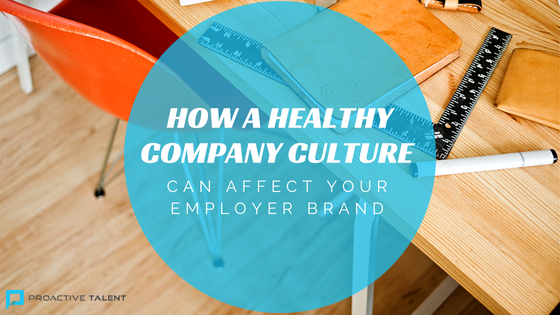
In today’s strong economy, employers are struggling to set themselves apart from the competition. Companies, now more than ever, need to focus on building a strong workplace culture, which is increasingly more important for job seekers as they weigh their numerous options. In this post, I’ll unpack what company culture means today and how building a healthy company culture can result in a strong employer brand.
Company culture is not the same as business objectives and it’s more than a list of words. It’s the shared beliefs and assumptions about the organization’s expectations and values. Essentially, it can be described as the sum of your company’s habits. Since culture is heavily based on your company’s past, creating a strong culture can be especially challenging – yet vitally important – for startups and young companies. Every employee your company hires at this crucial time will determine what your culture becomes. This is why it’s so important to be able to define what you want your culture to be early on, create goals around building it, and then take steps to make that happen.
For instance, your company culture goals could be:
1.Retention
2.Employee satisfaction/engagement (could be measured by a quarterly or annual survey)
3.Improved communication between leadership and general workforce
Once you’ve established your company culture goals, it can only be initially shared and adopted by employees when it is disseminated from the top down. While the messaging is extremely important, you must also be able to effectively deliver the message. Practice the 30/70 rule: 30% message and 70% messenger. In order to drive a successful initiative, the communication needs to be from the top down and bottom up. Your culture should be a part of the language at your company. This language is adopted by your employees when it is spoken by people in power and leadership. Leaders - from executives to middle management – also need to “walk the talk” and reward employees who are living out the company values. The biggest challenge to overcome when building your company culture is complacency on the part of leadership.
Check out our recent blog post, Your Foosball Table Is Not Company Culture, for specific ways to build a healthy company culture.
The days of working for one company your entire career are long gone. According to the Bureau of Labor Statistics, the average worker currently holds ten different jobs before age forty and approximately 30% of the total workforce will now change jobs every 12 months. Given the average pay raise when a person stays with their current employers is about 3% per year, if employees want to move up – particularly in title and salary – job hopping from company to company seems to be the most effective way to do that. Employees want a culture that also creates opportunities for learning. Businesses with a strong learning culture enjoy employee engagement and retention rates around 30-50% higher than those that don’t (Robert Half). Creating a healthy culture built on rewarding tenured employees, that offers opportunities for growth, and is aligned to shared values could be just the defense against this trend.
Millennials are especially motivated by a company’s purpose and mission, which makes them a flight risk if another employer more closely aligns to their values and passions. In 2014, the median job tenure was 4.2 years. In order to make it easier to retain your talent, you’ll need to make sure you have a clearly defined, healthy and attractive company culture intact.
Culture and Your Employer Brand
Not only will a strong and attractive company culture help you retain employees, it is also a significant advantage over your competitors. As simple as this sounds, it appears to be a big miss, across the board. A study by TruPath revealed less than half of employees felt there was a strong company culture at their employer. 64% of employees feel like they don’t have a strong work culture. Many employers are failing to provide their staff with what they need to be successful in the workplace, harming both the employee and the employer.
Nonetheless, culture continues to become a higher priority for job seekers. For 40% of North Americans, company culture and growth opportunities are what they are most concerned about when looking for a new employer. Furthermore, companies that implement a strong Employee Value Proposition (EVP) are 2x as likely to outperform the competition. In order to be attractive to job seekers and retain your talent, you will have to offer a considerable EVP.
Once you have established a healthy culture, the hard part is over and you can focus on the easy part – showcasing it. Getting the word out about what it’s like to work at your company will quickly improve your employer brand. Start leveraging your company’s culture to showcase your strong employer brand today!


